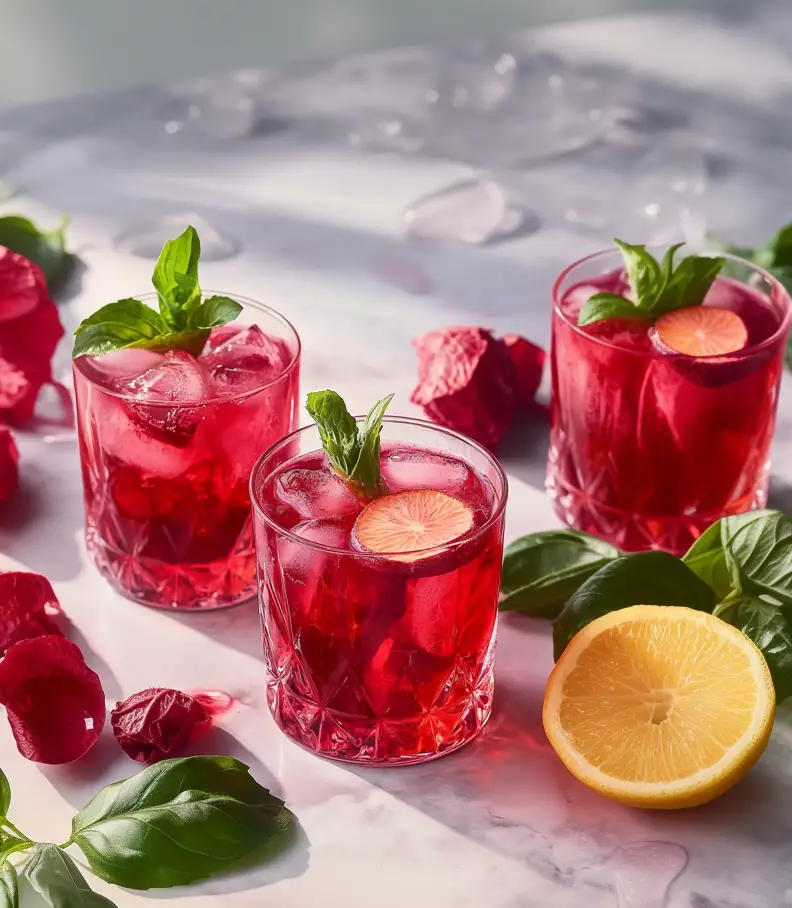This vibrant Hibiscus Tea is a refreshing, caffeine-free herbal drink made with just two ingredients. Enjoy it hot during cooler months or iced for a cooling summer beverage. Its tart, cranberry-like flavor is both invigorating and soothing. Plus, it’s rich in antioxidants and offers various health benefits.
Full Recipe:
Ingredients
- 1/4 cup dried hibiscus flowers
- 4 cups cold filtered water
- Sweetener of choice (e.g., honey, agave, maple syrup) – optional
- Ice – for serving
- Fresh mint leaves – for garnish
- Fresh raspberries – for garnish
Directions
- Place the dried hibiscus flowers in a quart-size Mason jar or pitcher.
- Pour in the filtered water and stir to combine.
- Refrigerate until the tea turns bright red, at least 20 minutes; for a deeper flavor, chill overnight.
- Strain the mixture to remove the hibiscus petals.
- Serve over ice.
- If desired, sweeten to taste and garnish with mint leaves and raspberries.
Nutrients
- Naturally low in calories
- Caffeine-free
- Rich in antioxidants such as vitamin C and anthocyanins
- May help reduce blood pressure
- May help lower cholesterol levels
- Supports oxidative stress reduction
Hibiscus Tea and Cardiovascular Health
Among the most studied benefits of hibiscus tea is its potential to promote heart health. Multiple scientific studies have suggested that regularly drinking hibiscus tea may contribute to lowering blood pressure. High blood pressure, or hypertension, is a major risk factor for heart disease and stroke, which are leading causes of death worldwide. The compounds found in hibiscus may act as natural diuretics and ACE inhibitors, mechanisms similar to some blood pressure medications, which help to relax blood vessels and improve blood flow.
In addition to its blood pressure-lowering effects, hibiscus tea has been shown to have cholesterol-lowering properties. It can help reduce levels of LDL cholesterol (often referred to as “bad” cholesterol) while potentially increasing HDL cholesterol (“good” cholesterol). Managing cholesterol levels is crucial for preventing the buildup of plaques in arteries, reducing the risk of atherosclerosis, heart attacks, and strokes.
The Role of Hibiscus Tea in Weight Management and Metabolism
Beyond cardiovascular benefits, hibiscus tea may also support weight management efforts. Some research indicates that compounds in hibiscus could help inhibit the absorption of starch and glucose, which could reduce calorie intake and promote fat metabolism. While hibiscus tea is not a weight loss miracle on its own, when combined with a balanced diet and regular exercise, it can be a helpful addition to a healthy lifestyle.
Its naturally tart flavor means it can be enjoyed without added sugars or sweeteners, making it an excellent alternative to sugary drinks like sodas and commercial fruit juices. Reducing sugar intake is one of the most effective ways to improve metabolic health and prevent issues like insulin resistance and type 2 diabetes.
Antimicrobial and Immune-Boosting Properties
Hibiscus tea also exhibits antimicrobial qualities that may help protect against bacterial infections. Its high vitamin C content supports immune function, making it a great beverage choice during cold and flu season or any time you want to bolster your immune defenses naturally. The tea’s refreshing nature can soothe sore throats and reduce inflammation, offering comfort during minor illnesses.
Cultural and Traditional Uses
The cultural significance of hibiscus tea varies globally. In Egypt and Sudan, for example, the drink—known as “Karkade”—is traditionally served during weddings and celebrations. In Mexico, it is called “Agua de Jamaica” and is a popular street beverage enjoyed throughout the year. These cultural traditions highlight not only the delicious taste but also the social and ceremonial importance of hibiscus tea.
In some parts of the Caribbean and Africa, hibiscus is used in folk medicine to treat high blood pressure and digestive issues. Its use as a natural remedy is deeply ingrained in traditional practices, showing how this herbal tea transcends simple refreshment to become part of holistic health approaches.
The Health Benefits and Cultural Significance of Hibiscus Tea
Hibiscus tea, made from the dried petals of the hibiscus flower, is a drink enjoyed by many cultures around the world. Known for its vibrant red color and tart, cranberry-like flavor, this herbal infusion has a rich history and a multitude of health benefits that have been recognized for centuries. Originating in regions such as Africa, the Caribbean, and parts of Asia, hibiscus tea is often consumed both hot and cold, making it a versatile beverage suitable for any season.
One of the most remarkable aspects of hibiscus tea is its high antioxidant content. Antioxidants are compounds that help protect the body from damage caused by free radicals—unstable molecules that can cause cellular damage and contribute to chronic diseases and aging. The antioxidants in hibiscus tea, particularly anthocyanins (the pigments responsible for its bright red color) and vitamin C, play a crucial role in neutralizing these harmful molecules. This makes hibiscus tea a powerful natural ally in supporting overall health and wellness.
How Hibiscus Tea Fits into a Modern Lifestyle
In today’s fast-paced world, people are increasingly seeking natural and functional beverages that offer health benefits without artificial ingredients. Hibiscus tea perfectly fits this trend. It is caffeine-free, making it suitable for people who want to avoid stimulants but still enjoy a flavorful drink. Its antioxidant-rich profile aligns well with the current focus on clean eating and wellness.
Additionally, hibiscus tea is simple to prepare and highly adaptable. It can be infused with other flavors like mint, ginger, or citrus fruits to create unique variations that suit personal tastes. Its versatility makes it a favorite among health-conscious consumers, bartenders, and culinary enthusiasts alike.
Potential Considerations and Precautions
While hibiscus tea is generally safe for most people, there are some considerations to keep in mind. Because it can lower blood pressure, those who already have low blood pressure or are on antihypertensive medications should consult a healthcare provider before consuming hibiscus tea regularly. It may also interact with certain medications. Pregnant and breastfeeding women are advised to limit their intake due to limited research on its safety during these periods. As with any herbal product, moderation is key, and it’s important to monitor how your body responds to the tea.
Conclusion
Hibiscus tea is more than just a beautiful and flavorful drink. It carries a wealth of health benefits supported by both traditional use and modern science. From cardiovascular support to antioxidant protection, immune boosting, and cultural significance, hibiscus tea stands out as a versatile and beneficial beverage. Incorporating hibiscus tea into your daily routine can be a delightful way to hydrate while supporting your overall wellness. Whether you enjoy it hot or iced, sweetened or plain, this vibrant herbal infusion offers a unique combination of taste and health that can enrich your lifestyle. Always remember to enjoy it mindfully and consult with health professionals if you have specific health conditions.






